
by Jonathan Azaziah
In the the first part of the series, prior plots against Syria were brought to light and the modern alliance between Zionism and the House of Saud was exposed, as were the directors of the Zionist-Saudi axis’ ‘Syrian Revolution.’ Here in the conclusion of ‘Kiss of ‘Democratic’ Death,’ the more clandestine hands attempting to deliver Syria into ruin will be revealed and all doubts to what this revolution actually is will be put to rest…
Media Manipulation: Zionism and Al-Jazeera Unite
No attack on sovereign nations, whether overt like in Libya or covert like in Syria, comes without a steady flow of propaganda against the ‘hostile environment’ being targeted. And the psychological warfare being waged against Syria is exceedingly heavy. The Zionist-run, Zionist-owned Western mainstream press was not alone in this sustained campaign of skullduggery though. This time around, it partnered up with the Qatari state media giant Al-Jazeera to boost the hasbara festivities and give them an ‘Arab’ feel, therefore granting ‘legitimacy’ to the aforesaid hasbara.
Al-Jazeera has operated with a pro-Israel, anti-Resistance stance from its inception, employing many Zionist hardliners to shape programming and reporting (73). The reason for this, unbeknownst to most, is that the US-backed Qatari dictator, Emir Hamad Bin Khalifa al-Thani, did not create Al-Jazeera, although he is its predominant fiancier. Al-Jazeera was created by the French-Israeli billionaire Zionist brothers, David and Jean Frydman, who set up the network to infiltrate media in the Islamic World and to control Middle East discourse on the Zionist occupation of Palestine. Both of them served as senior advisors to the Zionist war criminal prime ministers Yitzhak Rabin and Ehud Barak (74). Jean Frydman was also the personal financier of the father of Israel’s illegal nuclear program, war criminal Shimon Peres, and he poured millions of dollars into the ‘Oslo process (75),’ which tightened the Zionist entity’s stranglehold over Palestine.
For those who were unaware of Al-Jazeera’s hidden Zionist history and blind to its Zionist bias due to its ‘credible’ reporting on US war crimes in occupied Iraq and Afghanistan, the shroud of credibility began to vanish during the ‘Jan25 Revolution’ in Egypt, the hub being Tahrir Square in Cairo. Egypt’s revolution was/is a blend of Zionist infiltration through Western NGOs and globalist meddling at the highest level to counteract real frustration, real anger, real revolutionaries and their solidarity-anti-war-based activism.
The driving force behind the legitimate aspects of the revolution was Mubarak’s indentured servitude to Zionism and the pro-Israel administration in Washington D.C.; Tahrir Square’s protesters wanted an end to American military aid, an end to IMF domination, an end to Zionism and the liberation of Palestine. Activists repeatedly made these demands and continue to do so to this very moment. Al-Jazeera reported on none of it and continues to report on none of it, deliberately ignoring it and forging a watered-down false narrative to sell subscriptions to Western masses. Al-Jazeera’s analysis of the events in Egypt was completely dominated by Westerners from Zionist think tanks and NGOs, the same NGOs directing and funding the infiltration of the revolution (76).

Al-Jazeera further shot itself in the foot when it began covering the CIA’s coup attempt in Libya, peddling rumors, outright fabrications, unverified statistics and anti-Qaddafi propaganda as legitimate journalism to justify NATO’s invasion. Al-Jazeera’s work on Libya has been nothing short of warmongering (77). This is to be expected though, and not only because of the undeniable Zionism of Al-Jazeera. Al-Jazeera’s patron, the despot of Qatar, is entrenched in the criminal war being waged against Libya. The CIA-backed, Israeli-advised rebels are receiving anti-tank weapons from Qatar (78), they have already signed an oil-marketing deal with Qatar (79), and together, the Qatar Emir and the Libyan rebels have begged America like dogs to amp up its destruction of Libya (80). With Libya under NATO siege and Egypt’s revolution hijacked and crushed, Al-Jazeera turned its attention to Syria.
The Western media’s alliance with Al-Jazeera reared its ugly head from the onset of the ‘Syrian Revolution.’ As the last section completely exposed, the ‘peaceful demonstrators’ were actually armed rebels, with their weapons coming from Zionist ally Jordan and their orders coming from Tel Aviv, Washington D.C. and Riyadh. After months of lies and propaganda, the United States government has finally admitted that there are indeed armed rebels carrying out violence in Syria, stating ‘there are a lot of them (81).’ Mainstream media has deliberately ignored the provocations of and attacks on Syrian security forces that have occurred from the opening week of the revolt, in which the Saudi-Israeli-directed armed gangs fired on and killed policemen and torched courthouses, hospitals, communications centers and Bashar al-Assad’s party headquarters (82). Hundreds of soldiers have been killed by this Zionist-designed insurrection and at least three mass graves filled with Syrian security forces have been found already (83).
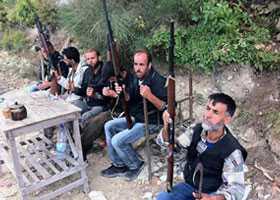
Instead of reporting these facts, Al-Jazeera has fabricated multiple eyewitness reports, bloated the death toll, broadcasted incitement against Bashar al-Assad, put forth the foreign policy objectives of the GCC dictatorships to bring down the Syrian government and ignored the vital fact that the Zionist-run National Endowment for Democracy (NED) is active on the ground in Syria (84). Instead of reporting these facts, the mainstream media and Al-Jazeera peddle the (admittedly) unverifiable, false casualty claims of London-based Syrian opposition groups, which boast about their membership with Zionism’s NED (85). Instead of reporting these facts, Al-Jazeera is manipulating imagery to fit with its anti-Syria agenda and paying actors to make false statements against Bashar al-Assad (86).
Mainstream media has consistently reported on snipers shooting at ‘pro-democracy’ protesters and has published recorded ‘eyewitness’ testimony from a member of Syrian security forces who ‘admitted’ that the snipers are Syrian military. The problem with this ‘eyewitness,’ like every other ‘eyewitness’ presented by the Al-Jazeera-Zionist media axis, is that his name isn’t real, his voice has been modified, and the person who supposedly produced the recording isn’t using his real name either (87).
None of it is real and everything is muddled because it’s another Zionist media fabrication. What is not being reported in the mainstream, is that the Syrian government has fully disclosed that there are indeed snipers firing not only on ‘protesters,’ but security forces as well (88). Mainstream media would never reveal that the snipers are agents of the Zionist-Saudi plan to destabilize Syria put together by Saudi National Security Advisor ‘Prince’ Bandar bin Sultan and the slippery Zionist criminal, Jeffrey Feltman (discussed earlier). The Feltman-Sultan plan, financed by $2 billion in Saudi funds, trained agents within Syria in sniper fire, arson and ‘sectarian attacks,’ all for the cause of fracturing Syria and terminating its support for Hezbollah and Iran (89). Hence, why the Zionist media is also spreading vile hasbara about Iranian forces and Hezbollah fighters assisting Bashar al-Assad ‘crush dissent,’ obvious lies originating from Mossad and its closest ally in Syria, the Syrian Muslim Brotherhood (90).
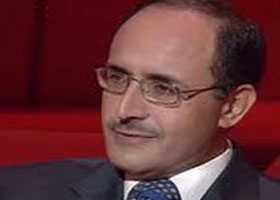
The nail in Al-Jazeera’s coffin in regards to its war on the Syrian nation is the resignation of its Beirut Bureau Chief, Ghassan Bin Jeddo, one of the most respected and objective journalists in the entire Arab world. Bin Jeddo, a fervent Arab nationalist and passionate supporter of Resistance to Zionism, resigned over Al-Jazeera’s shameless adherence to the foreign policy initiatives of the Zionist-Saudi alliance (91). He was furious that Al-Jazeera had launched a ‘smear campaign’ against Syria and labeled the network a ‘propaganda outlet (92).’ Going even further, Bin Jeddo declared “Al-Jazeera has resorted to gutter journalism. It is now an operations room for incitement and mobilization (93).” Ben Jeddo also confirmed that Al-Jazeera was fabricating information for its propaganda assault on Syria and expressed his disgust at the channel’s reporting on events in Bahrain (94). Ben Jeddo now plans to launch a new Arab channel from Beirut (95), presumably to counteract Al-Jazeera and its campaign against regional Resistance, Syria in particular.
Lastly, the demonstrations against Bashar al-Assad, despite their Zionist-Saudi financing and training have been minuscule considering Syria’s population consists of more than 20 million people. In contrast, the solidarity with the Resistance government has been tremendous and of course, not covered at all or mentioned in passing in typical ‘downplaying’ fashion by the Zionist media (Al-Jazeera included).

On June 21st, millions of Syrians hit the streets throughout the nation in solidarity with Bashar al-Assad and the Resistance, including the Zionist-Saudi-strongholds of Aleppo and Homs, shattering the illusion that the President had no support in these cities (96). On March 29th, just two weeks after the destabilization plot began, hundreds of thousands marched through Damascus and four other cities in solidarity with Bashar al-Assad, eclipsing the smaller demos held by Zionism’s agents, displaying pictures of the President and flags of Syria together with occupied Palestine (97).
The June 15th rally for Bashar al-Assad was equally impressive, with hundreds of thousands of supporters unveiling a 2.3 kilometer flag that stretched through the streets of Damascus and chanting, “the people want Bashar al-Assad! (98)” The Chaldean Bishop of Aleppo attended the massive rally and confirmed that not only do Syria’s Christians wholeheartedly support Bashar al-Assad but 80% of Syria does (99). Abroad, Bashar al-Assad is receiving the same support in global arenas like Bulgaria (100), Lebanon (101) and even Dearborn, Michigan (102). With global support and the overwhelming solidarity of the populace on Bashar al-Assad’s side, it is evident that what the Syrian people want is not the overthrow of the person defending their nation from Zionist colonization but his continued reign with the necessary reforms implemented to better Syria as a whole. It is also evident that the ‘Syrian Revolution’ is a carefully concocted media farce serving as a cover for a destablization plot that is being executed by Zionism and its allies.
Scott Creighton, a journalist and activist who operates the American Everyman/Willy Loman blog at WordPress.com, perfectly (and brilliantly) pegged the strategy of the mainstream media’s reporting on Syria as “activists’ said journalism.” Any person claiming to be an activist can call into the control rooms and operations boards of any media outlet and ‘report’ something, and because the person on the other end of the phone is claiming to be an activist, the said media outlet can print it without any investigation or discretion and present it as accurate, fact-based news. Unfortunately for the powers that be, this pathetic excuse for journalism crumbles under scrutiny as the ‘activists’ are all linked to Zionism’s NGOs which continue to hover at the center of the destabilization effort against Syria (103). And unfortunately for the powers that be, what their fake ‘activists say,’ is trumped by what the real activists say: ‘Resistance and Bashar are here to stay.’
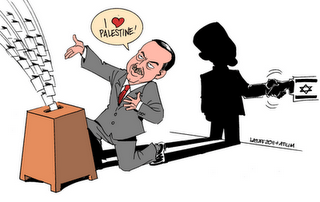
Turkey: The Beast of Two Faces Emerges
May 31st, 2010. Early in the morning, in international waters, Zionist naval commandos illegally stormed an aid ship known as the Mavi Marmara, a Turkish ship part of the Freedom Flotilla mission to break Israel’s criminal siege against the Gaza Strip, and in stunningly savage fashion, murdered 9 unarmed Turkish peace activists with the youngest being 19-year old Furkan Dogan, a dual Turkish-American citizen. The motive for this savagery, was to kill a historic nuclear agreement between Brazil, Turkey and Iran; which Israel did (104). Beyond that however, more so than another statistic on the Zionist entity’s century-old rap sheet, the attack on the Mavi Marmara was an act of war.
Turkish-Israeli relations had been going south since the Second Intifada. And each subsequent Zionist-initiated disaster/massacre, including Israel’s orchestration of Iraq’s destruction and its bloodthirsty, genocidal bombing of Lebanon in Summer 2006, soured ‘diplomacy’ even further. But it was at the 2009 World Economic Forum where, at least in appearance, civility between Turkey and the Zionist entity had hit a stonewall. Prime Minister Erdogan and the war criminal Shimon Peres shared a furious exchange in which Erdogan bashed the Zionist regime for its crimes against humanity in Gaza. In the aftermath, Turkey cancelled military exercises with IOF (105). Tension was at its peak, and analysts, activists and observers alike agreed that the Mavi Marmara murders were the proverbial straw that would break the camel’s back. It was believed that Turkey would cut its ties with the Zionist entity once and for all.
Everybody was wrong. Instead of withdrawing recognition of the usurping, occupying entity, the Turkish government bizarrely asked (over and over and over again) for it to apologize for its crimes and compensate the victims’ families with Zionist blood money. What is even more bizarre, is that after the Zionist entity humiliated Turkey to an even greater degree by stating publicly it would not apologize under any circumstances (106), Turkey still asked for the apology, as if it was a dog pleading with its master for a treat.
The incessant begging exposed Turkey’s real agenda and its attempt at portraying itself as a nation of Resistance slowly disintegrated. Turkey wanted entry into the European Union, a stronger role in NATO and desperately wanted the title of ‘regional power,’ serving as a power broker and go-between for East and West. How does a nation achieve such lofty ambitions? By bowing down to the Zionist entity of course. Recep Tayyip Erdogan, Turkey’s incumbent Prime Minister, accepted the ‘Courage to Care’ award from the ADL (107), a rotten, racist Zionist organization that has been linked to spying and other subversive activities for years. What kind of Resistance figure accepts an award from any Zionist institution, let alone one as vilely treacherous as the ADL?
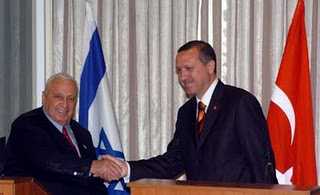
Additionally, Erdogan, a defender of Zionism’s Armenian Genocide and denier of it even being a genocide, came under fire from the Mossad-CIA psyop known as Wikileaks and in the aftermath of the ‘Cablegate’ scandal, sent helicopters to the Zionist entity during recent forest fires on ethnically cleansed land in Palestine (108). Erdogan and his government did not send helicopters to Pakistan, Yemen or Somalia after Zionist stooge Obama’s drone bombings. Nor did he send helicopters to illegally besieged Gaza or Lebanon after the Zionist entity’s murderous bombings in 2006 and 2008-09. No, he sent helicopters to ‘Israel’ to show solidarity with Benjamin Netanyahu and mend ‘broken’ relations.
All of the bluster aside, Turkish-Israeli relations were never strained. It was mere theater; surface hostility. More important than Erdogan’s pathetic, cringe-worthy Zionist solidarity, is what everything boils down to in geopolitics: money, and like the sorely-missed Malcolm X once said, “Zionists have mastered the science of dollarism.” Thousands of Zionist companies operate in Turkey with the gleeful blessing of the Turkish government (109). Turkish-Israeli bilateral trade amounts to at least $3 billion annually and leaders from both entities gloat that it is most likely much more than that. Within weeks of the Freedom Flotilla massacre, the Zionist entity and Turkey signed a military deal for $190 million worth of drone technology. Israel’s products (all of which are produced on stolen land from stolen Palestinian natural resources) are deeply entrenched in Turkish society, with nearly all of Turkey’s software, from cell phones to medical equipment, being produced by Zionism (110). Turkey and ‘Israel’ were never going to end such profitable dealings.
The continuing trade and business dealings between Tel Aviv and Ankara in the wake of the Mavi Marmara murders has brought all public animosity to a screeching halt. The Zionist regime and Erdogan’s government are now collaborating in order to doctor a UN report regarding last year’s Freedom Flotilla massacre, with Turkey asking Israel to minimize the damage that Turkey’s image may incur (111). In return, with heavy pressure from the Zionist regime (112), Turkey stopped the Mavi Marmara from sailing with the new Freedom Flotilla II – Stay Human mission to Gaza by refusing to let it sail from Turkish ports (113). And with Turkish-Israeli reconciliation now near imminent completion as Turkish and Zionist officials are working to put together an official ‘reconciliation’ document (114), Ankara and Tel Aviv are now focusing their energies on a most intricate (and regionally rewarding) project: executing the ‘Clean Break’ plan to ‘roll back’ Syria.

This is affirmed by the February comments of, Dr. Oded Eran, who served as the Zionist ambassador to the European Union, ambassador to Jordan and is currently the director of the treacherous Israeli Institute For National Security studies (115). He spoke in a most ominous manner about the Arab revolutions and the affect that they would have on Turkish-Israeli ties. Disturbingly, he stated, “Given the seriousness of the situation created by the political upheaval in the Arab world, this may accelerate the process of restoring Turkish-Israeli ties.” Eran also stated that it would be in the best interest of the Zionist regime and Turkey to cooperate in delivering stability to the Middle East (116). How better for Israel and Turkey to bring ‘stability,’ i.e. propping up dictatorships that support the hegemonic Zionist agenda and toppling those who don’t, than invoking the Israeli-Turkish joint intelligence agreement.
This 1993 Memorandum of Understanding (MOU) facilitated far-reaching, dastardly cooperation between Turkey and Zionism. The Zionist entity armed and trained the Turkish army in ‘anti-terror’ warfare along the borders of Iraq, Iran and Syria and Turkey allowed the Zionist entity to gather intelligence on Iran and Syria from within Turkey. The militaries of each entity meet frequently to discuss the prospects attained and assess it in the context of usefulness in future military and intelligence operations against ‘hostile environments.’ Under this agreement, Turkey is supporting the Israeli-Saudi operation against Syria in its entirety and it is assisting the Syrian Muslim Brotherhood’s incursions into the border town of Jisr al-Shughour militarily and with intelligence. All the while Turkey is exerting pressure on Bashar al-Assad to accept the Tel Aviv-Riyadh-Washington plans of regime change and step down (117). Erdogan has publicly declared that Bashar al-Assad’s response to the uprising is nothing short of “savagery (118),” knowing full-well that his country is supporting an armed insurrection.
Turkey’s involvement goes deeper. Turkish military and political leaders are heavily discussing the idea of setting up a buffer-zone within northern Syria, a deliberate violation of Syrian sovereignty. This will provide armed MB fighters easier entry into Syria to carry out the orders of Tel Aviv and Riyadh. Turkey has given safe haven to the Syrian Muslim Brotherhood’s leaders and recently hosted a high-level meeting between Syrian opposition figures and US officials (119). Ankara also hosted former CIA head and current Secretary of Defense Leon Panetta for five days in late April. The topic? Regime change in Syria (120). The Zionist-run US government has formed operational headquarters in southern Turkey near the Syrian border and has upped its aid to the Turkish army to assist Syrian dissidents in any way possible, including armed MB members (121). On the media front, the Turkish NTV channel has been churning out the same lies that the Zionist media has, including the lunacy about Iranian soldiers and Hezbollah ‘suppressing protesters (122).’
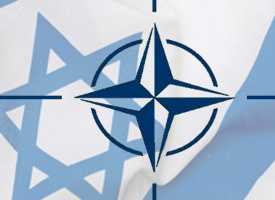
The most frightening development of all, is that Turkey has given the green light to NATO to transform the Izmir Air Station in western Turkey into a base for ground forces (123). Former Turkish diplomat Ozdemn Sanberk, who is well-known and is still frequently called upon by government circles (124) and is currently sitting on the High Advisory Board of the Global Political Trends Center, a think tank that openly collaborates with the Soros-funded London School of Economics (125), has stated in a recent interview that Bashar al-Assad is ‘doomed’ and has admitted that Turkey is pursuing a policy that will ensure the ‘demise of the (Syrian) regime while protecting Turkish security (126).’ Is Sanberk referring to a NATO invasion of Syria? With Ankara already militarily involved in Syria as per its MOU with Israel and the events that led up to the NATO invasion of Libya paralleling the events in Syria, such an action is not out of the question.
What makes Turkey’s involvement so dangerous to Syria and detrimental to Resistance throughout the region is that it is clearly a beast with two faces. It disgustingly wears a mask of Islam and Resistance to fool and manipulate the naive and the hopeful while its true face remains submerged in a mound of intrigue and subversion, all for its Zionist masters. And what exactly is the true goal of this Tel Aviv-Ankara-Riyadh axis, excluding the aforementioned ‘regional stability?’ It isn’t just regime change. This axis wants to take down al-Assad and replace it with a racist, Saudi-like regime that will cripple ties with Iran and recognize the Zionist regime as a legitimate country (127). It will be up to the Syrian people, not just Bashar al-Assad and his army, to fight this plot and save their country.

A Gay Girl In Damascus: Mere Hoax Or Israeli Intelligence Operation?
Hands down, without question, the most bizarre case that has come out of the Zionist plot to take down Syria is the blog known as ‘A Gay Girl In Damascus.’ This odd blog has been hailed and excessively promoted by the Zionist media over the last several months as a means to severely persecute Bashar al-Assad and the Syrian state as a whole. Supposedly, a half-Syrian, half-American lesbian blogger-activist named Amina Abdallah Araf al-Omari, who had been operating the blog for five years to raise awareness on Syria’s ‘poor human rights record,’ was abducted by Syrian security forces for her anti-regime activities. Apart from the obvious Zionist undertone beneath this persona and the story surrounding the ‘abduction,’ there was something else drastically wrong with all of it: nobody had ever met this ‘Amina Abdallah Araf al-Omari’ in person; not a single soul (128).
Nobody had ever met her before because, Amina Abdallah Araf al-Omari didn’t exist. She was the creation of 40-year old Thomas J. Macmaster from Stone Mountain, Georgia who now lives in Edinburgh, Scotland (129). But the trip through the realm of the bizarre doesn’t end there. It was uncovered that Macmaster once wrote about ‘Amina’s dream’ to learn Hebrew, live in the Zionist entity and represent Syria in the ethnically cleansed land now known as ‘Israel (130).’ Despite Macmaster then attempting to portray ‘Amina’ as pro-Palestinian (131), this single post revealed the very unsettling presence of Zionism.
And it gets more bizarre still. The ‘Amina’ profile was then linked to an Israeli website where Macmaster kept a log completely in Hebrew, something Macmaster has attempted to downplay as mere ‘web phishing (132).’ Phishing? Doubtful. Fishy? Absolutely. Once Macmaster was outed as the mastermind behind the Amina hoax, he issued an apology on the ‘Gay Girl In Damascus’ blog. Macmaster delivered the apology to the world from Istanbul, Turkey (133). Yes, of all of the places in the world to be while Zionism and Saudi Arabia direct armed insurrectionists against Syria, an American who is seemingly fluent in Hebrew is spreading hasbara about Bashar al-Assad and distributing fake reports about ‘human rights violations’ from Turkey, a central player in the ‘kiss of democratic death.’

Mask of Zion’s sources have confirmed that Macmaster had also befriended several prominent solidarity activists, scholars and (real) pro-Palestine bloggers on Facebook, the social networking giant owned by Zionist Mark Zuckerberg. It is necessary to document that Facebook was started with capital provided by men who were board members of CIA’s business wing, In-Q-Tel and is now being used by the agency to recruit personnel for its ‘National Clandestine Service (134).’ Zuckerberg met with Zionist war criminal Shimon Peres at the World Economic Forum in Davos, Switzerland in February 2009 to discuss ‘fighting anti-Semitism’ with Facebook (135), an Orwellian premise if there ever was one. And when the Zionist entity called on Zuckerberg to remove the ‘Third Intifada’ fan page from his website, he heeded the call and did just that, in violation of free speech everywhere (136). Facebook is a data-mining festival being monitored by the CIA that is literally run by Zionist thought police.
Why aren’t the important questions being asked? This was deception on a massive scale, and the links between Macmaster, the Zionist entity, Syria and Turkey at this particular moment in history are undeniable. They are not coincidental and they stick out like a peacock in a white room.
Why was Tom Macmaster allowed to operate a fraudulent profile on Zionist-owned Facebook, essentially keeping tabs on top personalities in the solidarity movement? Is Tom Macmaster an intelligence officer employed by the Zionist entity, the United States or is he an informant/asset of either/both? Indirectly of course, Macmaster is an asset of the Zionist-globalist agenda against Syria simply because of the hasbara he disseminated, but if in fact Macmaster was/is a paid intelligence agent, it raises a much more sinister question: how many more like Macmaster are out there? The answer could be tens, hundreds or even thousands, especially considering Israel operates a vast and hyperactive cyber warfare unit that employs thousands of agents (137). Lastly, if Macmaster was/is an intelligence asset, how much did the now-exposed two-faced Turkish government know about his activities? Was it assisting him? Protecting him? Are there others like Macmaster in Turkey?
Though these questions will most likely never be answered, what is clear is that the Zionist media will latch on to anything and everything that it can get its grimy tentacles on in its efforts to make Syria out to be a monster and justify a NATO invasion. What is also clear, is that activists must be careful, as Zionism’s agents lurk at every dark corner of the internet, which has become a battleground in the war of oppressed vs. oppressor.
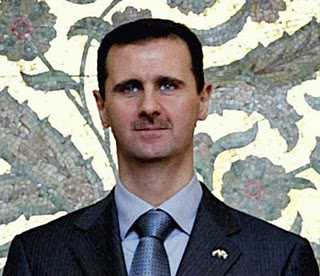
Conclusion: Long Live The Resistance
The Zionist entity and its coalition of devilish allies are just as relentless to topple Syria now as they were when the ‘Syrian Revolution’ first began in mid-March. And the ‘international community’ of warmongers and kleptocrats are raising the stakes. The International Criminal Court has issued an indictment for Bashar al-Assad for ‘murdering anti-government protesters (138).’ Was an investigation conducted? Of course not. Is there any evidence of such outrageous claims? No, not even a smidgen.
The US has imposed sanctions on Bashar al-Assad and six top officials in the Syrian government, a move that was condemned by Syria as ‘serving Israeli interests’ in the region (139). The EU, led by Zionist-dominated France, has imposed much more punishing sanctions, which have already taken effect on the everyday lives of Syria’s citizenry. The Assad government has lashed out at Europe and slammed its move as ‘economic warfare (140).’ France has openly pursued regime change in Syria with Saudi Arabia and the US since 2006 (141).
In addition to facing a Zionist-manipulated armed revolt on the homefront and sanctions hammering its economy from abroad, the Syrian government is being ripped to shreds in the Zionist media, which is now accusing Bashar al-Assad of being behind the Naksa Day protests in al-Jaulan on June 5th. He is being accused of paying poor farmers in the village of Majdal Shams $1,000.00 apiece to rush the ‘border’ with the Zionist entity in hopes of taking international attention off of his brutality against ‘pro-democracy’ protesters.
The origin of this pathetic information blows its smokescreen away however and reveals it as sheer falsehood. It was produced by none other than the Reform Party of Syria, headed by Farid al-Ghadry, AIPAC member and Zionist agent who as aforementioned, has been at the core of fueling the unrest in Syria (142). When this information failed to materialize as believable, the Zionist media then magically produced a ‘Syrian government’ document that ‘confirmed’ another one of its lies from a month earlier, that Syria organized the protests on May 15th, Nakba Day. Under scrutiny, this crashes and burns too.
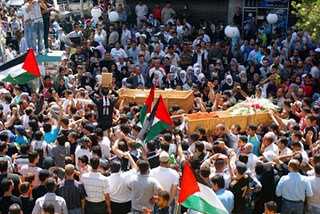
The ‘Syrian government’ document was ‘obtained’ by Michael Weiss (143), the head of Just Journalism, a widely-known Zionist propaganda outlet that is rabidly anti-Islam, anti-Arab, anti-Resistance and openly dedicated to ‘defending’ Israel in the media and whitewashing Israeli crimes (144). Weiss and the rest of the propagandists in the Zionist media failed to mention that the Nakba Day protests were organized by solidarity activists and Palestinian refugee rights groups from Lebanon and occupied Palestine with no connection to any government. These same activists
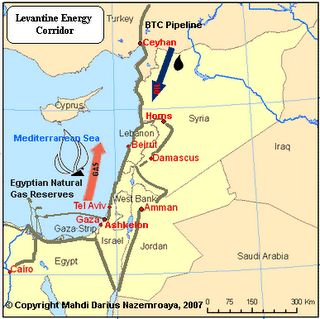
were involved in the June 5th Naksa Day events (145), which will now forever be remembered as the Naksa Day Massacre, as barbaric Israeli forces shot dead 23 Syrians and Palestinians, including a woman and a child, and wounded more than 350 other civilians for simply demanding Right of Return (146). Do not ever expect these truths to flow from the mouths of the likes of Farid al-Ghadry, Ammar Abdulhamid or Michael Weiss.
The Zionist regime and its allies are not in business to play checkers. Chess is the name of the game and the ‘rollback’ of Syria would only be step one in the greater scheme of things; greater as in Greater Israel. Behind the ‘kiss of democratic death’ to remove Bashar al-Assad and his Resistance government are two key Zionist goals: control of energy and domination of territory. Syria lies smack dab in the middle of two natural gas corridors that the hegemonic powers have had their eyes on for decades. The first unites Turkey and the Caspian Sea with Palestine and the Red Sea and the second unites (occupied) Iraq with the Mediterranean. Sitting within these corridors are massive natural gas fields off of the Levantine coastlines of Damascus and Beirut which Iran has offered Syria assistance in exploring and cultivating. If Bashar al-Assad is taken down, the Zionist entity and its Euro-American allies will step in and take over the Levantine energy project (147).
It is no secret that the Zionist entity’s goal has always been to extend its borders from the Egyptian Nile to the Iraqi Euphrates, ethnically cleansing everything in its path to make way for Greater Israel. Included in this sadistic project would be the confiscation of all of Syria and all of Lebanon (148). There are two obstacles standing in the way of the ultimate Zionist colonization project: Bashar al-Assad and the Lebanese Islamic Resistance movement, Hezbollah. If Bashar al-Assad and his government are defeated by the Zionist-Saudi-engineered uprising, the Lebanese Resistance will lose its only nation-state ally in the Arab world. Reports are already surfacing that Hezbollah is taking precautions against the fall of their ally by transferring missiles that are stored in secure caches in Syria across the border through camouflage to defend their weaponry from possible Israeli bombardment (149). Israeli-created, Qatari-funded Al-Jazeera has launched a full-scale propaganda campaign against hero, revolutionary and Hezbollah Secretary General, Sayyed Hassan Nasrallah, labeling him a ‘hypocrite’ for standing in solidarity with Bashar al-Assad (150).
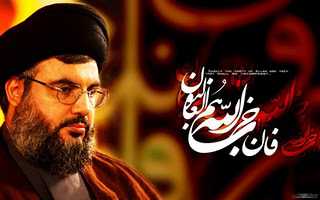
This insidious slander against one of, if not the only righteous leader in the Arab world is designed to drive a wedge between human rights factions and solidarity groups, splinter social justice movements and fracture Resistance blocs so Zionism’s tentacles can pick up the pieces and put them back together in the warped fashion of its choice. Hezbollah is the only reason why there are not criminal Zionist extremists living in US-subsidized settlements on the Litani River. Sayyed Hassan Nasrallah is the only voice that thunders loud enough to strike fear into the hearts of the Zionist entity’s leaders, who know that the Sayyed does not lie and does not exaggerate. Hezbollah is the only group in the entire region to deliver a conclusive military defeat to the Israeli occupation army, and the Zionist regime has long sought revenge for its humiliation at the hands of the Lebanese Resistance. Bashar al-Assad has supported Hezbollah’s steadfastness in the face of every act of Zionist intransigence. He will not abandon Hezbollah and Hezbollah will not abandon Bashar al-Assad, and this infuriates Zionism to no avail.
Beyond Lebanon and Syria lies the grand prize that the Zionist entity longs to conquer, demolish and rebuild as a Zionist colony: the Islamic Republic of Iran, and the Zionist-run mega-think tank known as the Brookings Institution has already laid out every possibility in ‘defeating’ Iran in a menacing policy study called ‘Which Path To Persia?’ This paper was written by a slew of influential Zionist policy makers including former ambassador to Israel and chief Zionist lobbyist Martin Indyk and former CIA analyst, Obama advisor and Zionist war criminal Bruce Riedel (151). Riedel frequently speaks at Israel’s Institute For National Security Studies in Tel Aviv and was the Zionist regime’s chief asset in the White House for Afghanistan policy (152). The Zionist-composed ‘Path to Persia’ paper speaks in-depth about Iranian influence over Syria and Hezbollah and discusses several options in eliminating this influence. The Brookings Institution has also published a recent paper that demands Bashar al-Assad step down and accept US-Israeli-mandated regime change immediately (153).
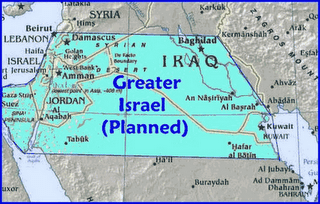
These are indeed grand plans, grand designs and grand plots for the Zionist entity to finally bring to fruition its supremacist fantasy of Greater Israel and what one-eyed war criminal and Zionist mass murderer Moshe Dayan called, ‘an Israeli empire (154).’ But what stands in the way of this hegemonic nightmare is the sincere, righteous Resistance that has kept the usurping Israeli entity from conquering Palestine despite 63 years of ethnic cleansing, massacres, mass murder, land theft, usurpation, assassinations, intimidation and demolitions. It has stopped Israel from turning Syria and Lebanon into Zionist colonies. It has stopped Israel from re-conquering the Sinai and it is firmly standing its ground in occupied Somalia and occupied Kashmir against the allies of Zionism.
The Zionist regime’s plans to take down Syria, Hezbollah and Iran will fail not only because the combined military might of these three powers are more awesome than Tel Aviv, London, Paris and Washington D.C. care to admit, but because these three powers have the backing of the people; the backing of the oppressed who would give their lives before bowing down to Western neo-colonial interests. Al-Jazeera’s vicious, degrading propaganda against Sayyed Nasrallah has been spat upon by the people of the region. Bashar al-Assad, as documented earlier, is receiving overwhelming support from the Syrian populace despite the ongoing Zionist-Saudi operation against his government. And Iran, despite thirty years of Zionist-British-American subversion against the Islamic Revolution, continues to flourish in defiance thanks to the backing of its people.
Israel’s ‘kiss of democratic death’ succeeded in bringing horrific chaos to Syria but it has failed in all other aspects. Al-Jumhuriyyah al-Arabiyyah as-Suriyyah will prevail today as it did yesterday under Bashar al-Assad’s late father, Hafez, in the face of the same Zionist tactics. Long live the Resistance, the almost ethereal force that has always served as a humbling reminder to oppressive powers. And in that spirit, may they be reminded again now: your reign, your games and your plots are as temporary as the night is dark.
~ The End ~
Kiss Of ‘Democratic’ Death: Israel’s Plot To Take Down Syria I
Sources:
(73) Al-Jazeera – Pro-Israel Arab Network by Rehmat’s World
(74) Sowing The Seeds Of Violence And Instability by Ghali Hassan, Counter Currents
(75) The Confessions Of Jean Frydman by Barry Chamish
(76) Al-Jazeera: An Island Of Pro-Empire Intrigue by Sukant Chandan, Monthly Review
(77) Al Jazeera Continues To Flog Mythical Libya Narrative by Martin Iqbal, Empire Strikes Black
(78) Libyan Rebels Receiving Anti-Tank Weapons From Qatar by Ian Black, The Guardian
(79) Libya Rebels Pen Oil Deal With Qatar by Marc Burleigh, Agence Presse France
(80) Libya Rebels, Qatar Urge Bigger US Military Role by The Arkansas Democrat Gazette
(81) Syrian Unrest Stirs New Fear Of Deeper Sectarian Divide by Anthony Shadid, The New York Times
(82) Media Disinformation: The Protest Movement In Syria by Michel Chossudovsky, Global Research
(83) Third Mass Grave Found In Syria by Press TV
(84) Al Jazeera’s War On Syria by Stephen Lendman
(85) The Siege Of Syria by Tony Cartalucci, Land Destroyer Report
(86) The Middle East Counter-Revolution by Thierry Meyssan, Voltaire Network
(87) ‘Snipers Ordered To Aim For The Head’ by France 24
(88) Syria: Who Is Behind The Protest Movement? Fabricating A Pretext For A US-NATO “Humanitarian Intervention’ by Michel Chossudovsky, Global Research
(89) Why Did Website Linked To Syria Regime Publish U.S.-Saudi Plan To Oust Assad? by Zvi Bar’el, Haaretz
(90) Hizbullah And Iranian Fighters In Syria by As’ad Abu Khalil, The Angry Arab News Service
(91) Ghassan Bin Jiddu: Resigns From Aljazeera by As’ad Abu Khalil, The Angry Arab News Service
(92) Al-Jazeera Beirut Bureau Chief Resigns by Press TV
(93) Al Jazeera’s Beirut Bureau Chief, Ghassan Ben Jeddo, Resigns by Yoshie Furuhashi, Monthly Review
(94) Ghassan Ben Jeddo: Resignation Reason Is al-Jazeera’s Method In Covering The ME Events by Syrian Arab News Agency
(95) Ghassan Ben Jeddo To Launch A New Channel by Anayou English
(96) 21 June: Massive Demonstrations In Syria by Voltaire Network
(97) Damascus – Hundreds Of Thousands In Syria March In Pro-Assad Demonstration by Vos Iz Neias?
(98) Syrians Rally In Support Of The President by Press TV
(99) Giant Pro-Assad Rally In Damascus, Bishop Says 80 Per Cent Of The People Behind Him by Asia News
(100) Syrians In Bulgaria To Stage Pro-Assad Rally by Sofia News Agency
(101) Beirut Pro-Assad Rally Swamps Vigil For Syria Dead by Agence France Presse
(102) Rally In Support Of Syria President Packs Dearborn Hall by Niraj Warikoo, Detroit Free Press
(103) More “Activists Said” Journalism On Syria, This Time At Raw Story by Scott Creighton, American Everyman
(104) The Reality Of Zionism by Jonathan Azaziah, Mask of Zion
(105) Turkish – Israeli Relations by Stephen Lendman
(106) Israel: We Will Not Apologize To Turkey Over Flotilla Deaths by Barak Ravid and Jack Khoury, Haaretz
(107) Prime Minister Erdogan Tells ADL That “Anti-Semitism Has No Place in Turkey” by The Anti-Defamation League
(108) Wikileaks Is Zionist Poison II: Deconstruction Of The Myth by Jonathan Azaziah, Mask of Zion
(109) New Crisis Simmering Between Turkey And Israel by Habib Toumi, Gulf News
(110) Turkey And Israel Do A Brisk Business by Dan Bilefsky, The New York Times
(111) Israeli Official: Turkey Wants UN To Tone Down Report On Gaza Flotilla Raid by Barak Ravid, Haaretz
(112) Gaza Flotilla Ship Mavi Marmara Will Not Join New Aid Mission by The Telegraph
(113) Turkish Ship Involved In Gaza Flotilla Raid Pulls Out Of Next Convoy by Barak Ravid, Haaretz
(114) Is Turkish-Israeli Reconciliation Imminent? by Alon Ben-Meir, The Jerusalem Post
(115) Experts: Dr. Oded Eran by The Institute For National Security Studies
(116) Arab Unrest Could Help Turk-Israeli Ties, Says Former Israeli Diplomat by Fulya Ozerkan, Hurriyet Daily News
(117) The Destabilization Of Syria And The Broader Middle East War by Michel Chossudovsky, Global Research
(118) Turkish PM Criticizes Syrian President, Calls Crackdown On Protesters Savagery by The Associated Press
(119) Analysis: Turkey Loses Patience Over Syria by Ibon Villelabeitia, Reuters Canada; Muslim Brotherhood And US Representatives At Syrian Opposition Conference In Antalya, Turkey by As’ad Abu Khalil, Monthly Review
(120) Report: CIA Chief Held Secret Talks On Syria In Turkey by Ynet
(121) ‘Turkey Executes US Plots In Syria’ by Press TV
(122) Turkey Leads Anti-Syria Smear Campaign by Press TV
(123) Turkey To Host NATO Ground Forces by Press TV
(124) Board: Ambassador (R) Ozdem Sanberk by Global Political Trends Center
(125) About GPOT by Global Political Trends Center; Hunting For Witches In An Ivory Tower by Danna Harman, Haaretz
(126) Assad Bound To Go, Says Former Turkish Diplomat by Hurriyet Daily News
(127) The Strategy Of The Saudi-Zionist Axis To Destabilize Syria by Mohammed Omar, The Islam Times
(128) ‘A Gay Girl In Damascus’ Comes Clean by Melissa Bell and Elizabeth Flock, The Washington Post
(129) New Evidence About Amina, The “Gay Girl In Damascus” Hoax by Ali Abunimah and Benjamin Doherty, The Electronic Intifada
(130) Tom Macmaster And His Zionist Agenda by As’ad Abu Khalil, The Angry Arab News Service
(131) On The “Gay Girl In Damascus” by As’ad Abu Khalil, The Angry Arab News Service
(132) My Interview With Tom Macmaster by As’ad Abu Khalil, The Angry Arab News Service
(133) “Gay Girl In Damascus” Comes Out As Tom Macmaster, Istanbul by Dimi Reider, 972 Magazine
(134) Facebook – The CIA Conspiracy by Matt Greenop, Global Research
(135) Israeli Prez: Use Facebook To Fight Hate by CBS News
(136) Facebook Drops ‘Intifada’ Page For Promoting Violence by BBC News
(137) Israel’s Unit 8200: Cyber Warfare by Damien McElroy, The Telegraph
(138) Syria: President Bashar al-Assad Faces Indictment By The International Criminal Court by Adrian Blomfield, The Telegraph
(139) Syria Condemns U.S. Sanctions On Assad by The New York Times
(140) Syria Warns Against Outside Interference, Fingers France by Ma’an News Agency
(141) Assad Has Run Out Of Friends, And Run Out Of Time by Rime Allaf, The Telegraph
(142) Syria Opposition: Anti-Israel Rioters Paid $1,000 by Ynet
(143) Report: Document Reveals Nakba Day Clashes Planned By Syria Government by Haaretz
(144) About: Mission Statement by Just Journalism
(145) Interview: Planning The Nakba Day Movement In Lebanon by Max Blumenthal, The Electronic Intifada
(146) 23 Martyrs Including A Child, A Woman And A Journalist, Over 350 Injured In Israeli Attack Against Syrian And Palestinian Citizens Near Occupied Golan by Syrian Arab News Agency
(147) America’s Next War Theater: Syria And Lebanon? by Mahdi Darius Nazemroaya, Global Research
(148) Jewish History, Jewish Religion: The Weight of 3,000 Years by Israel Shahak (rip)
(149) Report: Hezbollah Moves Missiles From Syria To Lebanon, Fearing Fall Of Assad Regime by Barak Ravid, Haaretz
(150) Al-Jazeera’s War On Sheikh Nasrallah by Rehmat’s World
(151)Which Path To Persia? Options For A New American Strategy Against Iran by Kenneth M. Pollack, Daniel L. Byman, Martin S. Indyk, Suzanne Maloney, Michael E. O’Hanlon and Bruce Riedel, Brookings Institution Press
(152) Afghanistan – Obama’s War For Israel by Christopher Bollyn
(153) Syria: Intervention Inevitable by Tony Cartalucci, Land Destroyer Report
(154) Israel’s Grand Design: Leaders Crave Area From Egypt To Iraq by John Mitchell Henshaw, Media Monitors
http://www.maskofzion.com/2011/07/kiss-of-democratic-death-israels-plot_06.html, 6 July 2011






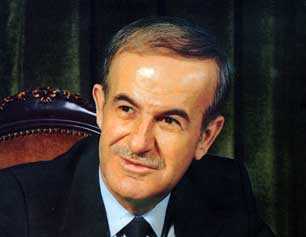

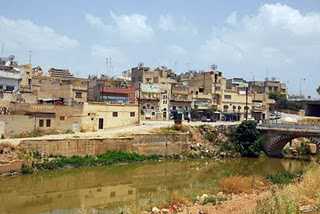
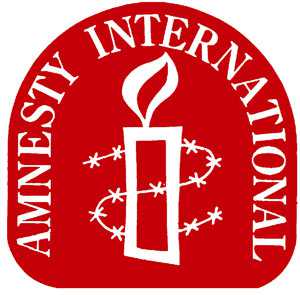

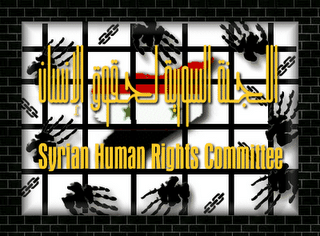






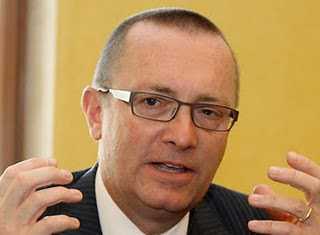
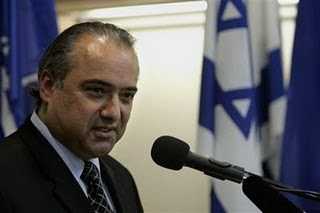
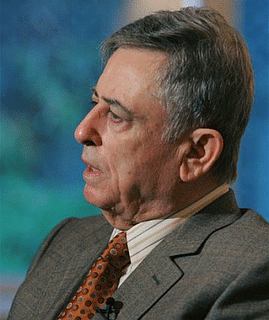
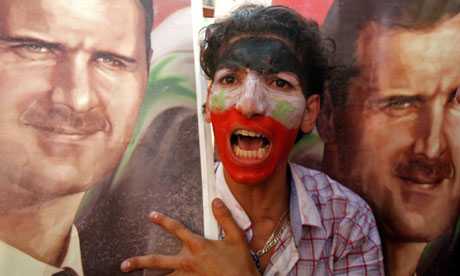
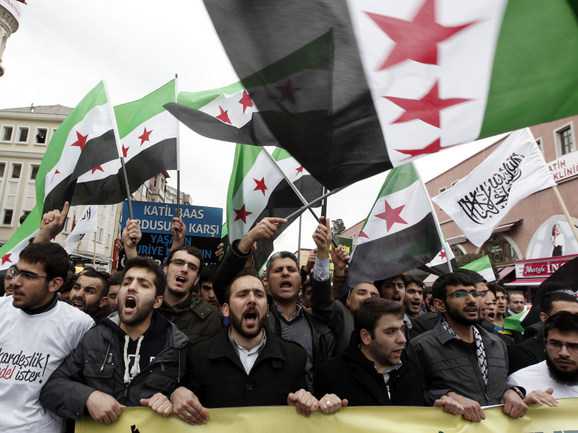
 NICOSIA — The regime of President Bashar Assad has acknowledged increasing attacks on its military believed aided by neighboring Turkey.
NICOSIA — The regime of President Bashar Assad has acknowledged increasing attacks on its military believed aided by neighboring Turkey.
